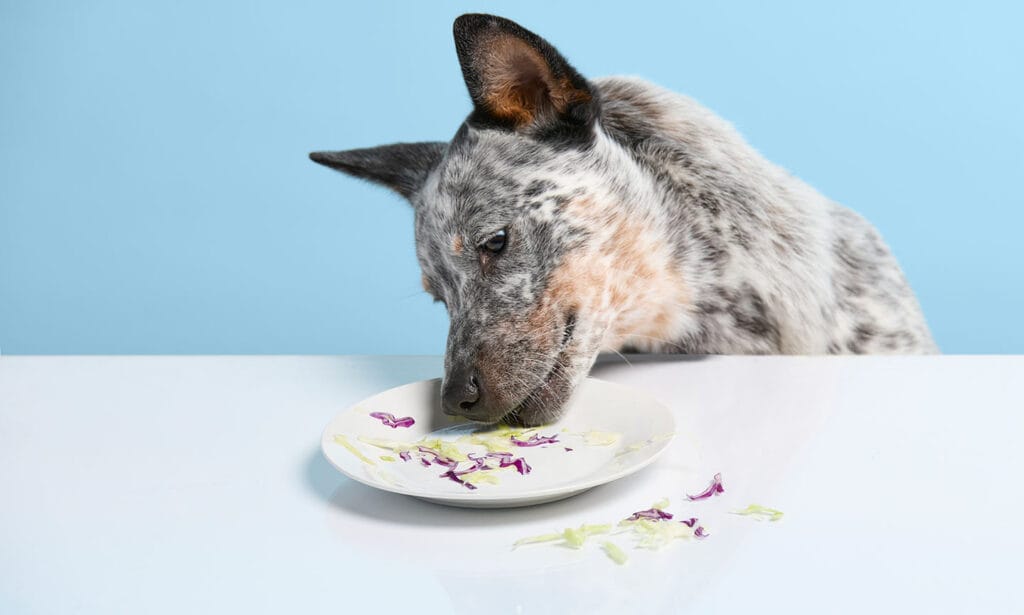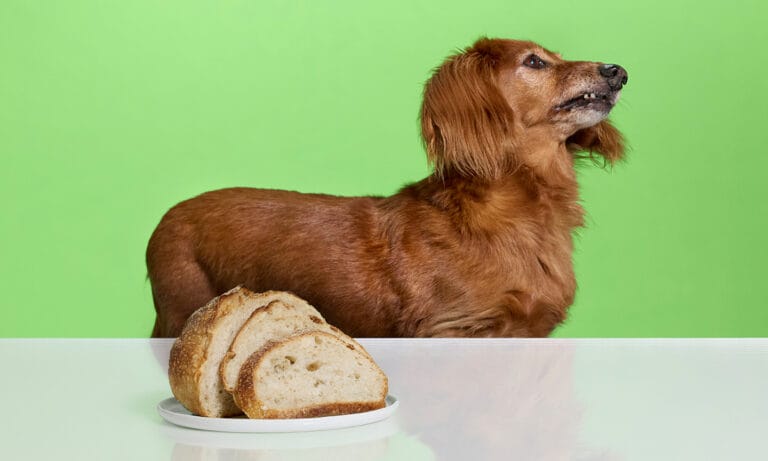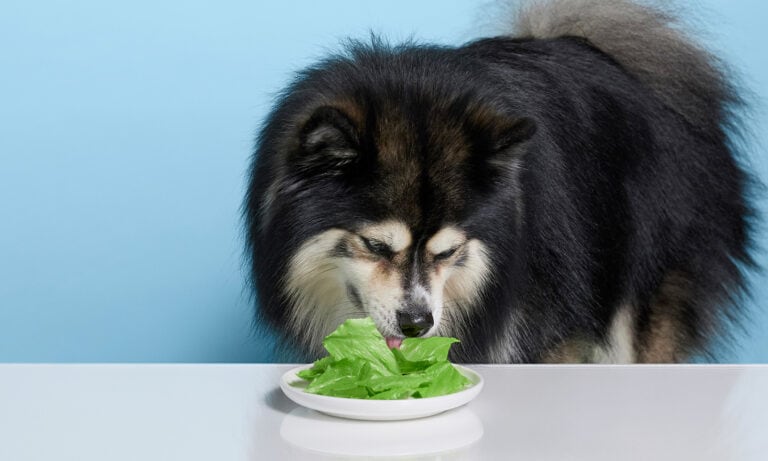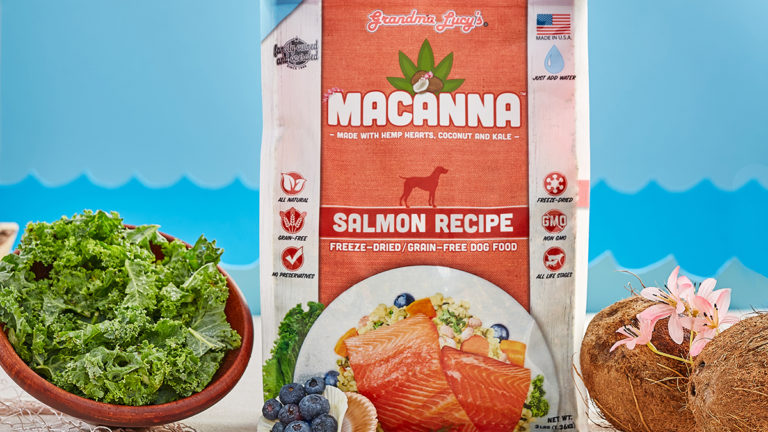Dogs aren’t known for being especially picky eaters. For many dogs, if you’re serving it to them, they’re probably going to eat it! Of course, that doesn’t mean you should give them every scrap from your plate.
But can dogs eat cabbage? It’s a vegetable, so it must be good for your dog’s health, right? The short answer is yes, dogs can eat cabbage—but there are some things you need to consider before giving your dog cabbage (or any new food). We spoke to a vet expert to learn all about dogs and cabbage.
Expert input provided by Dr. Josey Hutchins, DVM, emergency veterinarian at Memphis Veterinary Specialists & Emergency in Cordova, Tennessee.
Can Dogs Eat Cabbage?
Click to jump to each section.
What Kind of Cabbage Can I Feed My Dog?
There are more than 400 varieties of cabbage grown around the world, and as long as the cabbage is cooked, your dog can eat pretty much any kind.
Of course, you’re not going to find all 400 varieties in your local grocery store. Here are some of the most popular dog-friendly types:
- Red cabbage
- Green cabbage
- Savoy cabbage
- Napa cabbage
- Bok choy
Dogs can also eat other members of the cabbage family, like Brussels sprouts and kale. Yes, kale is closely related to wild (uncultivated) cabbage, and it’s often considered a type of cabbage that forms loose leaves instead of a denser, rounder head.
How Do I Feed Cabbage to My Dog? And How Much?
When it comes to feeding cabbage to your dog, consider the following.
Cook It First
It’s better to give your dog cooked cabbage than to serve it to them raw. According to Dr. Hutchins, the cooking process softens the cabbage, which makes it easier to digest. This reduces the likelihood that your dog will experience digestive problems and stomach upset that can happen with eating cabbage raw.
That’s because the fiber in raw cabbage is tougher to digest and may lead to more significant gas issues, especially if your dog eats too much. So, your dog may have trouble getting it down (or even turn their nose up at it).
Don’t Use Any Butter or Seasonings
If you decide to treat your dog to cabbage, keep in mind that they can’t eat it prepared the same way many humans like it best. Butter can cause pancreatitis in dogs, and some spices or seasonings are bad or even toxic (garlic and onion, for instance) to them. We promise, your furry friend won’t miss the extra flavor that we humans might require in order to enjoy cabbage.
You can, however, cook cabbage for your pooch in a healthy oil, like coconut oil—as long as your dog's not allergic to it or prone to pancreatitis.
Keep Portions in Check
Even with cooked cabbage, make sure to keep portions in check. “What happens if I give my dog too much cabbage?” you may wonder. Primarily, giving them too much can upset their digestive system and, if they really eat a lot, it can cause thyroid issues.
As a general guideline, you should gradually introduce cabbage into your dog’s diet, starting with very small quantities. But specific portion sizes depend on your dog's size and individual tolerance, according to Dr. Hutchins.
Dr. Hutchins recommends the following serving guidelines:
- Smaller dog breeds: 1 teaspoon
- Larger dog breeds: a couple of tablespoons
After giving your dog some cooked cabbage leaves, keep a close eye on how they react.
If they get digestive issues like gas or bloating, try decreasing the serving size. If your dog is especially sensitive, and reactions continue or worsen, it’s best to forego the cabbage in favor of other nutrient-dense veggies that your dog doesn’t react to.
Give Directly or Add to Their Dog Food
As for how to physically give your dog the cabbage? You can add small pieces to your dog’s food, or give it to your dog directly as a treat if they really like it.
Benefits of Cabbage for Dogs
Now that we’ve answered the question, “Can dogs have cabbage?”, the next question becomes: “Is cabbage good for dogs?” The answer to that is also yes.
Here are four health benefits of giving your dog cooked cabbage, according to Dr. Hutchins:
- Contains fiber for digestion: Cabbage has a high fiber content, so it can promote good digestion and regular bowel movements when consumed in its cooked form. Because of this, adding cooked cabbage to your dog’s diet may also help alleviate constipation.
- Has a lot of nutrients: Cabbage is rich in nutrients, like vitamin A, vitamin C, vitamin K, potassium and calcium. It also contains manganese and a small amount of magnesium, which can support healthy muscles, nerves, bones and joints.
- Great for weight management: Because cabbage has a low-calorie content, it can be a great treat option for overweight dogs. Even if your dog is at a healthy weight, you can use cabbage as a treat without worrying about adding a lot of excess calories to their day.
- Provides antioxidants: Cabbage contains antioxidants, which boost your dog’s immune system and shield against oxidative stress and free radicals, according to Dr. Hutchins. Overall, antioxidants help to fortify and protect your dog’s health.
Risks of Feeding Cabbage to Dogs
There are no huge risks to feeding your dog cabbage, but Dr. Hutchins says there are some things that dog parents should be cautious of.
Cabbage Can Cause GI Discomfort
Eating large amounts of cabbage can cause excessive gas, bloating, flatulence and general gastrointestinal (GI) discomfort due to its high fiber content.
This is more common with raw cabbage, but it’s something to keep in mind when feeding cooked cabbage as well.
Cabbage Can Impact Thyroid Function
Cabbage also contains natural compounds that can have a negative impact on thyroid function if eaten in excess. These compounds break down into thiocyanate, which interferes with iodine absorption and can disrupt the functioning of the thyroid gland. This is more problematic for dogs with existing thyroid issues, like hypothyroidism, but it’s something to be aware of, even for healthy dogs. (However, they would need to regularly consume a lot of cabbage for problems to develop.)
FYI: This concern applies to cruciferous vegetables in general, including broccoli, Brussels sprouts and cauliflower. Cooking cruciferous veggies typically neutralizes thiocyanate production, offering a double benefit: improved thyroid safety and enhanced digestibility.
Cabbage Can Present a Choking Hazard
Because cabbage is really fibrous and challenging to chew, it can pose a choking hazard, especially for an overzealous pooch who likes to inhale their food.
To reduce this risk, cut cabbage into very small pieces before giving it to your dog.
More human foods dogs can eat:
Share:











